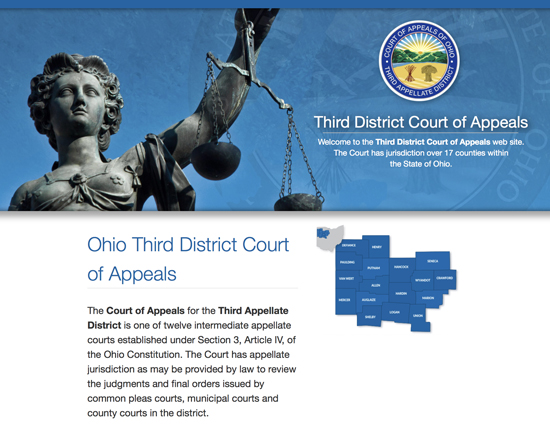Man’s conviction on sex charges upheld
DAVE MOSIER/independent editor
LIMA — A decision by the Third Ohio District Court of Appeals has upheld the conviction of Thomas D. Rupert on sex-related charges.

In a decision written by Judge John Willamowski, the conviction of Rupert on two counts of gross sexual imposition was affirmed.
Rupert, through attorney Marley C. Nelson, had appealed the verdict sentencing him to an aggregate prison term of 60 months (five years) on the charges, claiming that the verdicts were against the manifest weight of the evidence against him, and that the prosecutor in the case engaged in misconduct that prevented him from receiving a fair trial.
Van Wert County Prosecutor Eva Yarger represented the state in the appeals process.
On January 3, 2019, the grand jury indicted Rupert on five counts: rape, a felony of the first degree; gross sexual imposition, a felony of the third degree; gross sexual imposition, a felony of the fourth degree; sexual battery, a felony of the second degree; and sexual battery, a felony of the third degree. The victims in the case were both under the age of 13.
Rupert pleaded not guilty to all five counts and a jury trial was held October 28-30, 2019, in which a jury returned not guilty verdicts on the rape and sexual battery counts but found him guilty of gross sexual impositions.
He was later sentenced to 30 months in prison on each count, to be served consecutively to one other.
In writing his opinion, Judge Willamowski noted that the charge of gross sexual imposition prohibits people from having “sexual contact” (touching of an erogenous zone for the purpose of sexual arousal) with others who are not their spouse when they are under the age of 13.
“There is no dispute in this case that the two victims were under the age of 13 at the time of the offenses,” Willamowski wrote. “Thus, the only questions is whether there was credible evidence that Rupert had sexual contact with the victims.”
The judge noted that one of the victims testified that Rupert would “grab her hand and force her to touch her breasts, her vaginal area, or his ‘private area’.” She also testified that Rupert would touch her vaginal area, breasts, and butt. While most of the touching was while she was clothed, there were two instances where Rupert touched her vaginal area under her clothing.
The other victim noted that Rupert had rubbed the outside of her vaginal area under her clothes, but on top of her underwear.
Rupert argued the victims’ testimony was not credible because there were discrepancies in both girls’ statements. However, Judge Willamowski stated that judging the credibility of witnesses is up to the jury in a case.
“The jury clearly took its task seriously as it found Rupert not guilty of Counts 3 and 4, which were also based on (the victims’) testimony,” the judge wrote in overruling the first assignment of error.
In the second assignment of error, Rupert claims he was denied a fair trial because the prosecutor accused him of committing perjury during his testimony during closing arguments.
“The test for prosecutorial misconduct is whether the remarks were improper and, if so, whether they prejudicially affected the accused’s substantial rights,” Willamowski wrote, noting that prejudice is shown when there is a reasonable probability that, without the improper remark by the prosecutor, the result of the trial would have been different.
Although he noted that the prosecutor’s statement that “if a person will abuse a child, what’s a little perjury?” was improper, Judge Willamowski added: “the fact that the prosecutor made one isolated remark during closing argument does not automatically make the trial unfair.”
The judge went on to say that a review of the closing argument as a whole does not show the error was prevalent throughout the closing argument.
The appellate judge also noted that the jury was given proper instructions by the trial judge that statements made by a prosecutor during closing arguments are not evidence.
“Given all this, along with the evidence presented at the trial, this Court does not find that the single prejudicial statement by the prosecutor in this case was prejudicial,” Willamowski said in overruling the second assignment of error.
Judges Vernon Preston and William Zimmerman concurred in the appeals decision.
POSTED: 02/04/21 at 8:44 am. FILED UNDER: News







